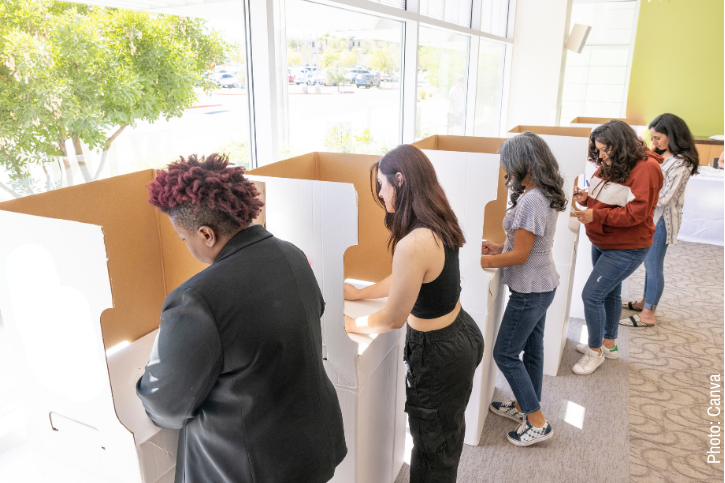On 17 July 2025 the British government announced its plans to lower the national voting age from 18 to 16 years old for future general and local elections. The plans would bring voters in England and Northern Ireland in line with Scotland and Wales, which lowered the voting age for their parliaments in 2015 and 2020 respectively. The UK thus follows Austria and Malta which were the only European countries that have lowered the voting age to 16 for national elections so far.
This can only be described as a seismic win for intergenerational justice. The reforms would see approximately 1.5 million new voters in the next election, whilst also enforcing heavier fines for those who breach political finance rules or abuse election campaigns.
Angela Rayner, deputy prime minister, cited an erosion of public trust in democracy as one of the main reasons for the change. In another interview she listed the civic responsibilities and rights that 16- and 17-year-olds already bear, suggesting that voting rights should be brought in line with these policies. She told the BBC “I was a mum at 16. I mean you can go to work, you can pay your taxes, and I think that people should have a vote at 16. I think we should engage young people in the democratic process and that they should be able to do that.” She also combatted one common argument against lowering the voting age – that is, the assumption of young people’s political and cognitive immaturity – by stating that some of the questions she gets asked by school students are “harder” and more switched on than the questions posed by trained adult journalists.
However, the move has not been without its critics. While the Liberal Democrats see the plans as a “no-brainer”, the Conservative party questions a perceived double standard which would see 16-year-olds able to vote but not “marry, go to war, or even stand in elections”. Reform UK is also against lowering the voting age. Other critics online cite their concern about young people being overly manipulated by family members or misinformation on the internet when voting.
So why is voting at 16 a win for intergenerational justice and what are some common misconceptions about it? Let us start with a few misconceptions (which can be found in more detail on our web page about voting rights):
But young people are not mature and politically interested enough? Would they even bother to vote?
Adults do not need to reach or demonstrate a certain level of maturity or political knowledge before they can vote. In any case, many young people (not all, but then not all adults either) can think for themselves and make a conscious social, moral or political decision before they are 16 years old. Indeed, the widespread engagement of young people in protest movements such as Fridays for Future shows a pronounced political engagement from an early age. Giving them the right to vote would harness their energy, make them feel listened to, and provide good voting habits for the future.

The assumption that young people are unengaged in politics is founded in a negative stereotype which casts them as inadequate and apathetic citizens. Statistics suggest that the turnout of first-time voters — whether 16, 18 or 20 years old — tends to be lower than the overall average, but higher than in some other age groups.
But their parents would just tell them what to do?
Young people start to become influenced by other people in their circles between the ages twelve and thirteen, when the influence of their friends and acquaintances starts growing. There is no empirical evidence of their parents exerting an unreasonable influence on the electoral decisions of younger voters. In any case, all of us, whatever our age, are influenced by the people around us anyway.
But who would they vote for?
There is no evidence to suggest that young people do or would vote for extreme or joke parties more than older people.
But what about other age limits like the age of criminal responsibility? How can somebody vote if they are too young to even be punished?
Other age limits are not comparable with an age limit on the right to vote because they do not entail a deprivation of a fundamental human right – the right to vote.
But what about extremism and misinformation on social media and online?
The increasing popularity and influence of social media, which allows political views and information to be spread online unchecked, has indeed allowed a concerning platform for misinformation, and sometimes extremism, to develop. For example, in 2024 in the UK, misinformation on social media was used to incite violent riots against migrants and people of colour, following the fatal killings of three young girls at a dance class in Southport. Concern has been expressed by some voices in the UK that lowering the voting age to 16 would only allow more extreme parties to gain more votes.
The FRFG as an organisation is concerned by the increased distrust in accurate and unbiased journalism and the spread of misinformation online. This trend is also often associated with a troubling distrust in public services and traditional democratic structures. However, the FRFG argues that misuse of social media, misinformation, and targeted political marketing are not exclusively a problem for young people, or indeed under 18-year-olds: it is a problem that must be dealt with internationally so as to preserve informed voting and democratic values for all age groups. While the FRFG welcomes the UK’s plans to lower the voting age, we expressly demand clearer measures on combatting misinformation including the introduction of more expansive civic and political education in schools.
As the above section demonstrates, many arguments against lowering the voting age are inaccurate. Associating adulthood with voting competency is also historically skewed and unfounded. Until the Second World War, most countries had a voting age of 21. 18, like 21, is an arbitrarily chosen age that does not correlate to individual responsibility or competency.
So, why is the UK lowering the national voting age to 16 a win for intergenerational justice? And is it enough?
(The below arguments are recounted in more detail in the FRFG’s policy paper Voting rights for adolescents and older children).
Universal suffrage is an essential right
As stated in Article 21 of the Universal Declaration of Human Rights (1948), individuals possess the inherent right to participate in government processes through direct voting or by selecting representatives. Furthermore, the Convention on the Rights of the Child (1990) recognises the freedom of children to express their opinions on matters that affect them, especially in cases where government decisions significantly impact their lives. There is no valid reason to exclude young people from voting and the assumption that suffrage is exclusively for adults needs to be challenged. Policies concerning education, the environment, social care and many other areas impact young people directly and they should have the chance to vote on them.
Demographic change means policy change
Europe reached a historic turning point in 1998. The population expanded to 728 million and then, for the first time in centuries, stopped growing. Demographic ageing in Europe, the United States, many Asian countries, and elsewhere means that older generations represent an increasingly dominant part of the electorate.
Young people have unique needs and perspectives that are not necessarily represented by an older electorate. Enfranchising their voices will positively inform policy. For example, evidence suggests that older voters (and especially those without children themselves) are less inclined than younger voters to favour policies such as raising child benefits or expanding public childcare. A report by the Intergenerational Foundation earlier this year also highlighted that government spending in the UK on older generations has increased disproportionately compared with growth and spending on children. This report has shown that “the gulf in spending per pensioner versus per child has increased by 170 per cent from 2004–05 to 2023–24. Investment and benefits spent on younger generations have been cut in order to maintain and increase spending on the NHS, concessionary travel and pensioner benefits, despite low growth and tightening budgets.” A lack of funding for children and young people can increase entrenched problems and corrosive disadvantage over time. Enfranchising young people by lowering the voting age to 16 (or alternatively, by introducing voting by registration, as detailed below) helps bring unique perspectives into the fore that are often forgotten.
It must be noted that the disenfranchisement of young people is also a problem in some of the youngest populations in the world. Indeed, in those countries, the situation is often even more stark. For example, according to the Population Reference Bureau, in 2020 over 41 per cent of people living on the African continent were under the age of 15, with over 50 per cent of the continent ineligible to vote. This can well be described as a ‘gerontocracy’.
Lowering the voting age instils trust in democracy and an understanding of civic duties
Although the evidence is mixed, studies from many nations around the world, including Austria, Cuba, Nicaragua and Brazil, haven often demonstrated that decreasing the voting age has been linked to higher levels of institutional trust, political interest, and an increased contentment with democracy.
Furthermore, in lowering the voting age, societies can create the groundwork for lifelong civic habits. Voting at a young age instils in people a feeling of civic duty and a conviction that their opinions matter, creating a lifelong commitment to taking part in democratic processes. Indeed, this argument is supported by recent data which has shown that in German general elections between 2017 and 2021, the turn out for 18-to-29-year-olds from states where they were already able to vote at 16 was much higher than for 18-to-29-year-olds in states with voting at 18.
So, what are the FRFG’s demands for Germany and beyond?
The FRFG welcomes the proposal to lower the voting age to 16 in the UK, as it sets an important precedent for other nations to do the same. The FRFG would welcome Germany (and other equivalent democracies globally) following suit, bringing the nation into line with the states and municipalities where it is already possible to vote at 16. However, our proposal goes a step further than votes at 16, arguing for a system called ‘vote by registration’. With this system, young people who wish to exercise their right to vote should be able to register (without their parents) in a voting list as soon as they want to. There should still be an age limit above which everyone can vote, but those below the official voting age should still be able to vote if they expressly wish to do so. This system would be accompanied by improved civic education to help informed voting in all age groups, an encouragement for parties to propose young people as candidates, and stronger laws against voter exploitation, harassment and discrimination. The FRFG also calls upon the media to shape the narrative about youth involvement, moving away from stereotypes about youth apathy.
For more details about this proposal, please refer to our policy paper on the topic.
References
BBC News (17 July 2025): 16 and 17-year-olds to be able to vote in next general election, government plans. https://www.bbc.co.uk/news/live/c93kkg37n3kt Viewed on 27 August 2025.
Bidadanure, Juliana (2021): Justice Across Ages: Treating Young and Old as Equals. Oxford: Oxford University Press.
GOV UK Press Release (17 July 2025): 16-year-olds to be given right to vote through election reforms. https://www.gov.uk/government/news/16-year-olds-to-be-given-right-to-vote-through-seismic-government-election-reforms Viewed on 27 August 2025.
Eichhorn, Jan / Huebner, Christine (2022): Evidence from Germany: Does reducing the voting age to 16 lead to higher turnout at elections? https://blogs.lse.ac.uk/europpblog/2022/10/20/evidence-from-germany-does-reducing-the-voting-age-to-16-lead-to-higher-turnout-at-elections/. Viewed 27 August 2025.
Manchester Evening News (14 August 2024): Mapped: The rioters jailed for bringing violence to Britain’s streets over days of chaos. https://www.manchestereveningnews.co.uk/news/greater-manchester-news/mapped-rioters-jailed-bringing-violence-29737743. Viewed on 27 August 2025.
Nakkan, Connor (2025): A Growing Divide: Two Decades of Intergenerational Unfairness. A research paper by the Intergenerational Foundation. https://www.if.org.uk/wp-content/uploads/2025/05/A-growing-divide-two-decades-of-intergenerational-unfairness-interactive.pdf. Viewed 27 August 2025.
Stiftung für die Rechte zukünftiger Generationen (2024): Voting Rights for Adolescents and Older Children. A policy paper by the FRFG. https://intergenerationaljustice.org/wp-content/uploads/2024/08/PP_Voting-Rights.pdf. Viewed 25 August 2025. (German original edition (2017): Wahlrecht für Jugendliche und ältere Kinder.)
Vanhuysse, Pieter / Tremmel, Jörg (2019): Measuring intergenerational justice for public policy. In: Lever, Annabelle / Poama, Andrei (eds.): The Routledge Handbook of Ethics and Public Policy. London: Routledge, 472-486.




